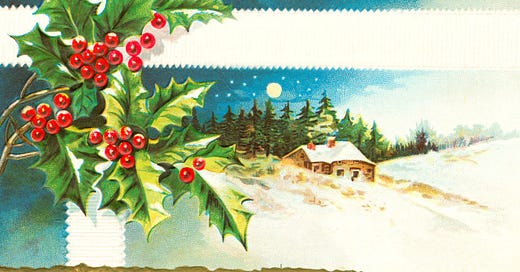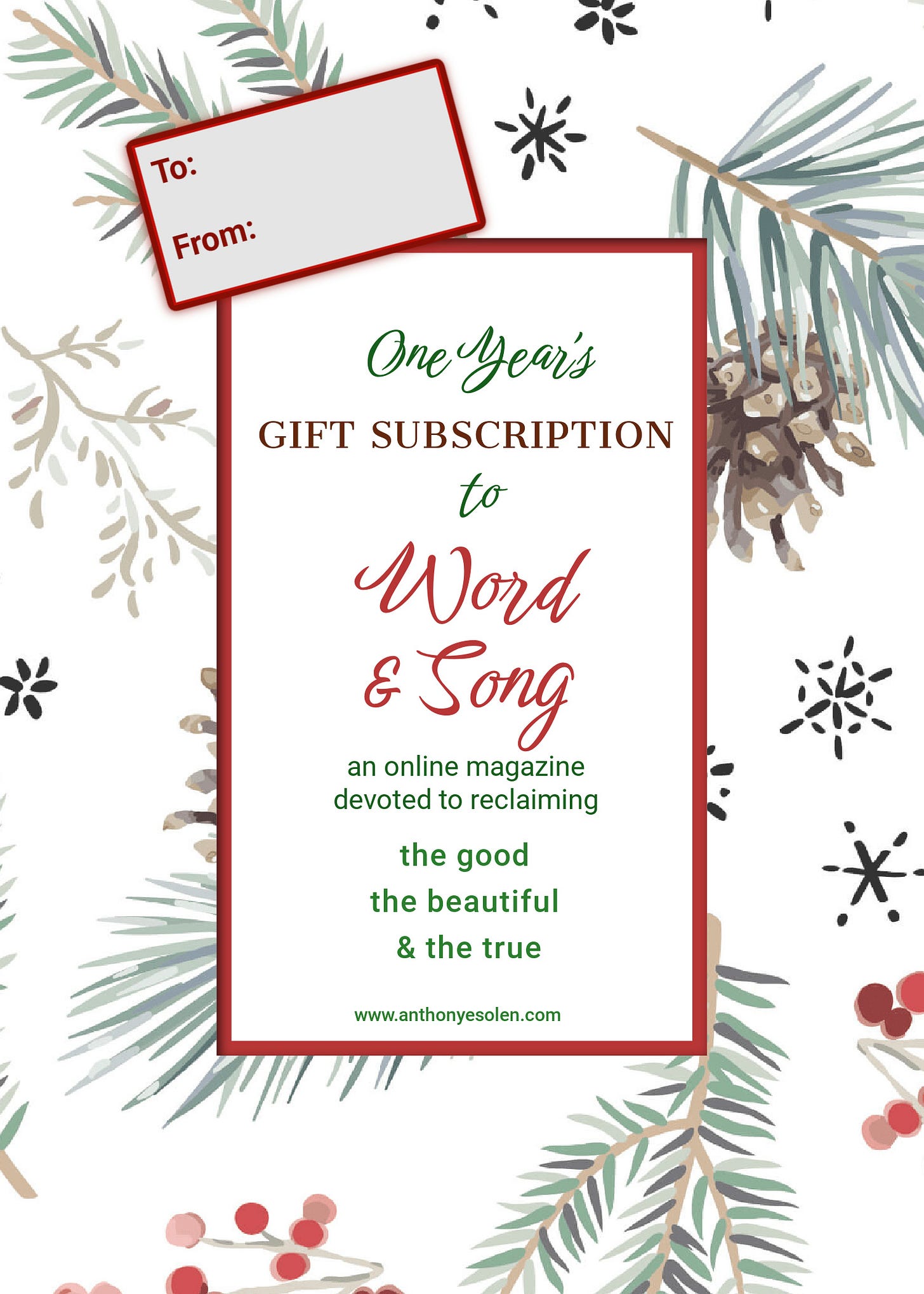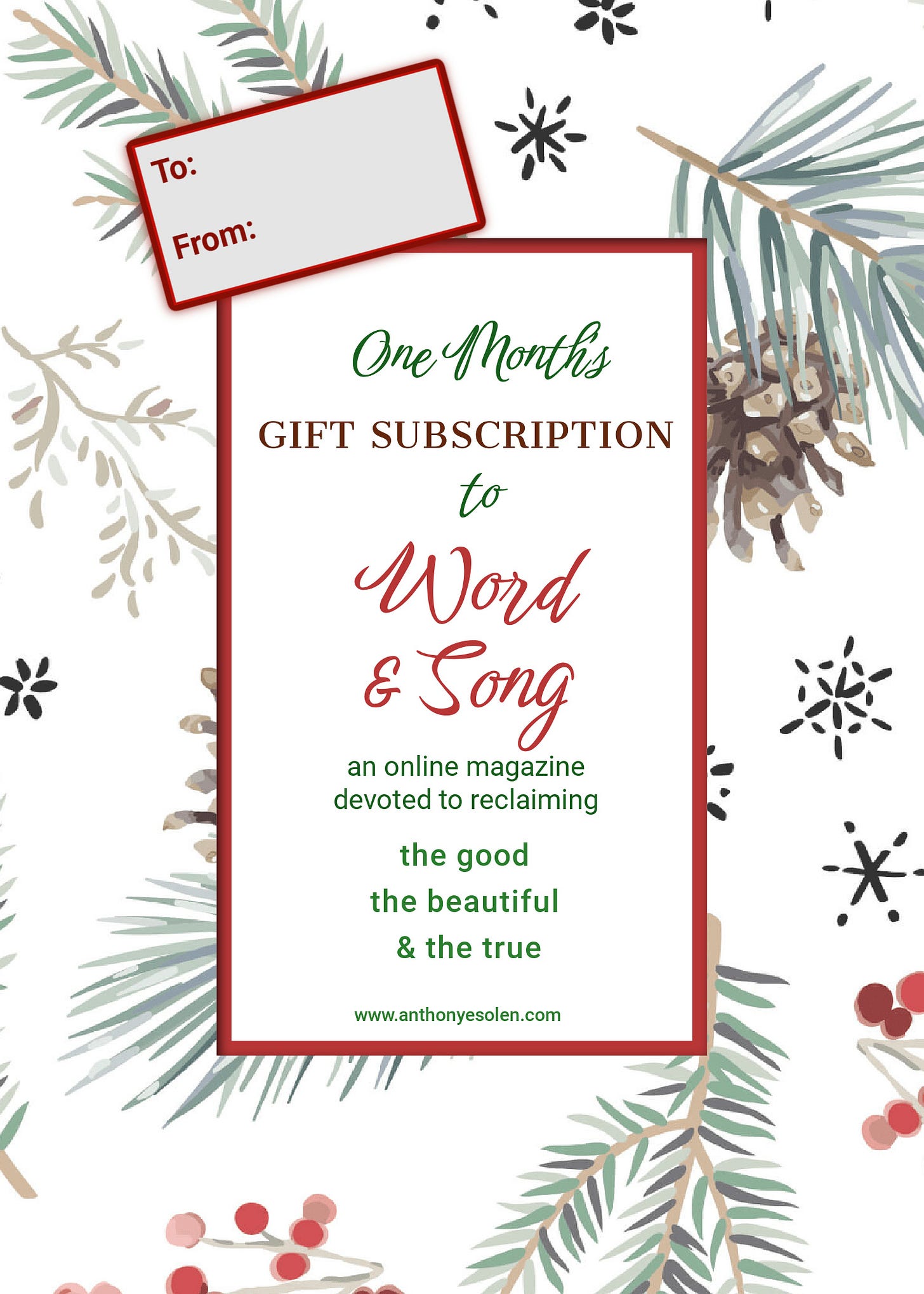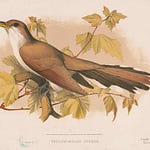Advent is here, and so are our Christmas offers at Word & Song!
Click on either of the buttons below to learn more.
(Paid subscribers, see very bottom of this page for your special discount.)
Today, as we left our church in the early evening, I looked to the west to see Venus, what Milton calls, thinking of her appearance in the morning, “Fairest of stars, last in the train of night.” Then in the east I saw Jupiter, big and bright, and Saturn between the two, closer to Venus and not nearly so bright, but still as bright as a star of the first magnitude. It pleased me to see them. I can’t say that I saw them as somebody in the days of Milton would have done. All this world, meaning every creature on earth and in the skies, was an allegory of love and wisdom. We have to use words for our allegories, or pictures, but the Creator can use things themselves, so that a star is both that tremendous ball of fire and a sign of power, constancy, and light. Lessons and carols were everywhere to be found. When Milton describes Creation, for example, he doesn’t scorn to consider little things, like “the parsimonious Emmet,” meaning not some stingy fellow named Emmett, but the Ant, industrious and social; and we can learn from the ant, says Solomon.
Our Word of the Week, holly, is obviously a Christmas word, because it shows up in many a folk song and folk tale associated with Christmas. But how did it get to be so? Well, think of what moved the worthy singers in Germany to come up with their carol about the Tannenbaum, the fir tree. These are evergreen — another great English word. When all the world is cold and dark, as it is in December in the northern lands, the holly is boldly green, standing out against the snow, especially with its bright red fruit. Now, if you say that someone at some time or another scratched his head and said, “Hey, the holly would make a good symbol for Christmas, because just when the world is pretty bleak, the holly is alive and cheerful,” you’ve probably put the Christmas cart before the horse. Instead, people saw that it simply was a Christmas plant, that it was meant to be so, that that was its heart and soul, and that was why the Author sowed our fields with it in the first place. The world is a book, and the holly decorates one of its most beloved pages.
We in English speaking lands don’t just use sprigs of holly to trim our doors and lintels at Christmastime. We weave them into wreaths. That word, like about twenty other wr- words in English, like wrinkle, wriggle, and wrap, has to do with twisting and turning, like their cousins the ver- words in Latin and her daughters. Those include verses, which get their name from the turn you make as you go from the end of one verse in a poem or a song to the beginning of another. Why, the universe is just one great big thing turned in one whole turn, a universe of hollies and wreaths and Christmastime, among a few other things too, like wrapping paper and children wriggling with excitement and old people’s faces full of kindly wrinkles as they smile.
But to go back to that wreath of holly, think of how fitting it is for the season. The evergreen holly says to us that life, not death, is the foundation and the aim of reality, and the circular wreath hints at its endlessness and eternity. That’s why the good Sir Gawain, in the great poem we know by his name, has that wreath of angles, the five-sided star which the poet says we call “the endless knot,” portrayed on the outside of his shield, while on the inside of his shield, what he beholds when he must use that shield for defense, is a portrait of the Virgin Mary. Nor is it any coincidence that the poet gives Gawain that shield in a poem that begins and ends in Christmastide.
Most of the plants in the holly family are evergreens, like what we commonly call the holly in English speaking countries. The holly bushes in the front of our house in New Hampshire are the typical ones you find in these parts, with the spiky points on their glossy green leaves. Those spikes gave it its Latin name, acrifolium, meaning sharp-leaved, which becomes Italian agrifoglio, meaning the same; the Poles have the same idea, in ostrokrzew, which means sharp-bush. But I like better the Danish name, kristtorn, Christ-thorn, perhaps glancing at the Passion, as the Germans seem to do in their Stechpalm — prickle-palm.
In America — I am not sure about Great Britain and Australia and New Zealand — Holly became a pretty popular name for girls for quite a while, though we didn’t have any in the schools I went to. That’s a common thing in human languages, to name girls after flowers and other beautiful plants. In case you’re wondering, hollyhock is not related to holly, neither in biology nor in the history of English! It meant holy-hock, with hock as the old word for the worthy marsh mallow. Not the candy, but the flower, though in old days people did make that candy with the flower as its mild and pleasant flavor.
With marshmallows or without, it’s on toward the great feast, which will be with us in a few days!
Listen to this episode with a 7-day free trial
Subscribe to Word & Song by Anthony Esolen to listen to this post and get 7 days of free access to the full post archives.















